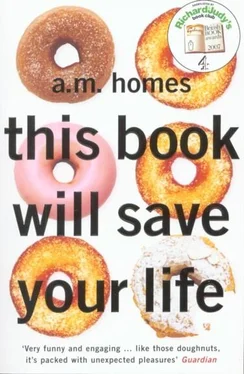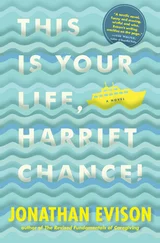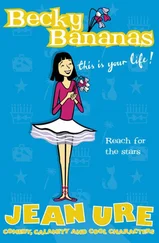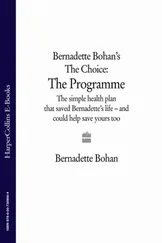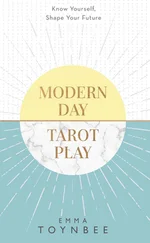A. M. Homes
This Book Will Save Your Life
HE STANDS at the glass looking out. The city spreads below him, blanketed in foggy slumber. Low pressure. Clouds roll over the hills, seeping out of cracks and crevices as if the geography itself is sending smoke signals.
Below him, far down the hill, a woman swims, her long brown hair floating through the water. Her suit is a beautiful bright-red dot, a rare tropical bird in a pool of unnatural blue. Every morning she swims — crawls like an Olympian. He takes comfort in her swimming, in her determination, rhythm, routine, in the fact that she is awake when he is awake. There is urgency in her stroke; she cannot not swim. She is his confidante, his muse, his mermaid.
He is at the glass; usually he is not here, not now. Usually he gets up and gets on his machine — he runs while she swims. He runs watching the electronic ticker tape go by, trading from a keyboard strapped to the treadmill, typing as he trots, placing his bets, going long and short, seeing how far up or down he can go, riding an invisible electronic wave.
Usually he, he usually. Everything today is not the same, and yet it is exactly the same and it can never be the same again.
He stands at the glass. The mechanical sounds of the house catch him off guard. Ice tumbles into the freezer bin, the coffeepot begins to fill with water, air whooshes out of the vent, billowing up the leg of his pants. He shudders.
"Hello?" he calls. "Anybody home?"
Usually he doesn't hear it. He hears nothing, feels nothing, he makes sure of that. He wakes up, puts on his noise-canceling headset, goes to the glass, looks at the woman swimming, and gets on his machine.
He is in a vacuum of silence — life canceled.
He didn't even know the coffeemaker was automatic — he doesn't drink coffee; it is brewing for Cecelia, the housekeeper, who comes between seven-thirty and eight. He breathes deeply — nice, the smell of coffee.
After years of making sure that he is left alone, he is suddenly afraid to be alone, afraid not to hear, not to feel, not to notice. He presses his ear to the glass. Music. Up the hill men are installing a lawn where there would otherwise be nothing — scrub. They have built a bulkhead, a frame for the grass, and are rolling out sod. They are making a small putting green — one hole.
Above and below, a chain of houses climbs the canyon wall: a social chain, an economic chain, a food chain. The goal is to be on top, king of the hill — to win. Each person looks down on the next, thinking they somehow have it better, but there is always someone else either pressing up from below or looking down from above. There is no way to win.
He stands at the point of the house, where two thick panes of glass meet, a sharp corner jutting out over the hill like the prow of a ship. He stands — captain, lord, master, prisoner of his own making.
Ahead, in the distance, there is something orange and smoky; it takes him a moment to decide — brush fire or simply dawn in Los Angeles?
YESTERDAY SEEM realer than real, a dream, an accident, like some sort of seizure or suspension. Did something happen? There is a depression in the earth, a large soft circular indentation that he doesn't remember from the day before. He looks at it, mentally measuring — approximately eight feet in diameter, about fifty feet from the house. Where did it come from? How long has it been there? How would he describe it? Like the mark made by the back of an enormous ladle pressed into the earth. Do things like that happen overnight?
On the floor of the living room, on the glass-topped coffee table, near the sofa, in the otherwise ordered world, there is debris, little bits of things, plastic nubbins, a piece of tubing, ripped paper, a single piece of bloody gauze — proof.
He is thinking about the pain. It started as a knotty cramp in his back, a strange tightening from his gut up into his chest. The lentil soup he had for lunch? He waited. He took an antacid. It got worse, spreading, searing knifelike down the leg, pressing up into his jaw, a rock-hard ache, a long sharp knitting needle poking into his arm, pain trickling into his fingers — were they numb? His whole body splitting like an ax cutting through fresh wood, a spasm pulling his shoulder blades back like a bow arching, bending him forward, curling him into a cramped crushing "c," a hard, violent spasm that could crack a man in two. He didn't think to call anyone, didn't know who to call, what to say, exactly where was the pain? It was everywhere, staggering, sweaty, dizzy-making.
Early on, while he still could, he went into the bedroom, put on a nice pair of pants, a belt, a casual sweater, shoes and socks. He dressed as if he were going out with friends, to a dinner party, to some low-key event, muted colors, soft fabrics. He dressed thinking he might have to get himself down the hill, to a doctor's office, not realizing that it was already late, already past the hour when anyone would still be there.
He lay on the sofa, something he'd never done before; it was against the rules — the private, personal rules we all have for ourselves — no lying down except in bed and never during the day.
He lay on the sofa trying to get comfortable. Was it something he'd done with the trainer, some wrong twist or turn? Or maybe he was getting a bug, cold or flu? The pain continued. How had it come upon him? Had the pain just started, or was it always there and he was just now noticing?
He got up, took some ibuprofen, and stood at the glass looking out over the city, at cars on the boulevard below making the turn, climbing into the hills. The sky was starting to fade, headlights were on, houses were glowing with life. The coyotes howled. The city in the distance was both so large and small.
He was standing at the glass — overcome by pain. Collapsing, every blood vessel, every nerve, every fiber in his body folded in on itself, as though starved, parched. He was standing at the glass in pain, and the strangest thing was he didn't know where it hurt, he couldn't feel anything.
He began to cry. He cried without making a sound, and when he realized he was crying, the very fact of crying, or the fear of it, told him that something was very wrong. And he cried harder.
Was this "It"? Was this how "It" happens? Was there something before this, something he should have noticed, a warning? Or was this the warning? Either this was the warning or this was IT.
HE DIALED 911.
"Police, fire, ambulance."
"Doctor," he said.
"Police, fire, ambulance."
"Rescue," he said.
"Police, fire, ambulance." It was a recording.
"Ambulance," he said
"One moment please."
He waited to be connected, and in the moment of silence, the pain left. The pain passed, and then he began to think it was all a nightmare, a daydream, a lousy lunch gone down wrong.
Just as he was going to hang up, a woman came on the line. "What is the emergency?" she asked, and the pain returned, reminding him.
"Pain," he said. "Incredible pain."
"Where is the pain?"
"I think this is IT," he said.
"Sir, where are you feeling the pain?"
"Everywhere."
"Have you sustained an injury — a gunshot wound, fall, snake bite, bow and arrow?"
"No," he said. "No. I'm home, I've been home all day. It's seeping through me, it's like I'm soaking in pain."
"How long have you been in pain?"
"I don't know."
"Minutes, hours, days?"
"Hours at least." But it could be days or years — he had no idea.
"On a scale of one to ten, how much pain are you in?"
"Ten."
"How would you describe the pain — sharp, throbbing, stabbing, dull?"
Читать дальше
